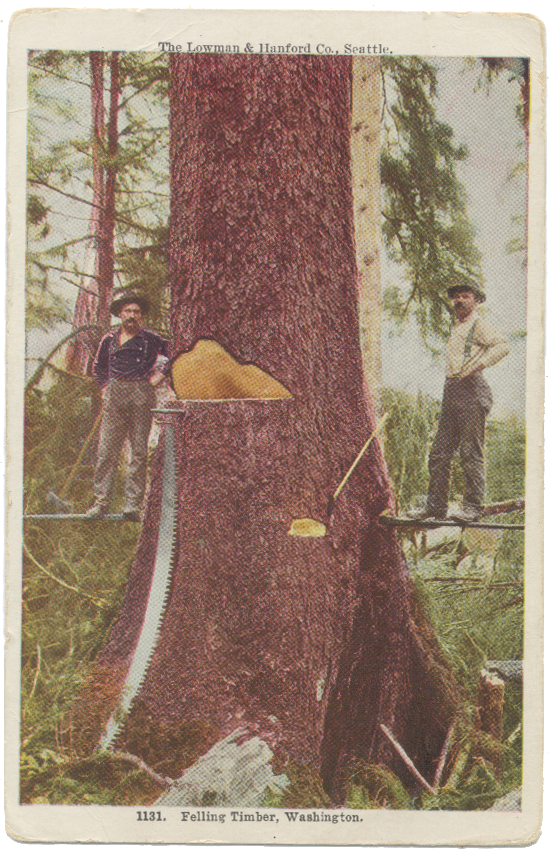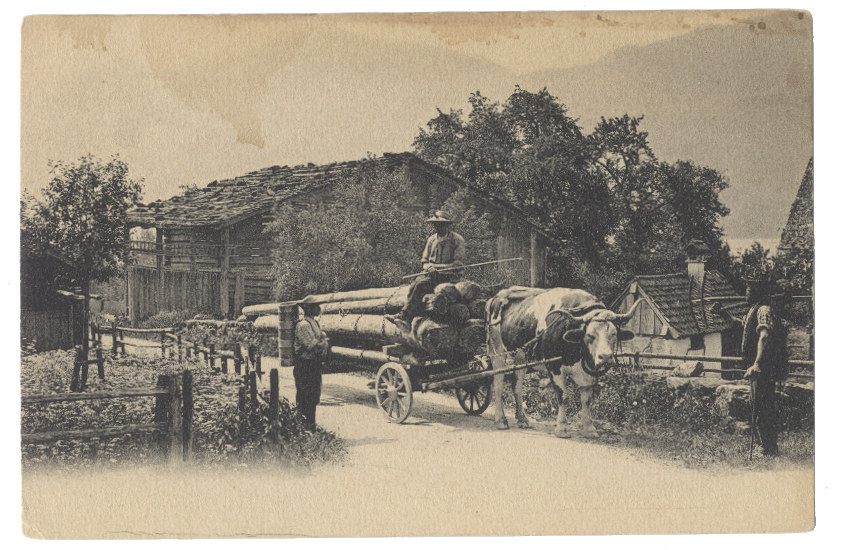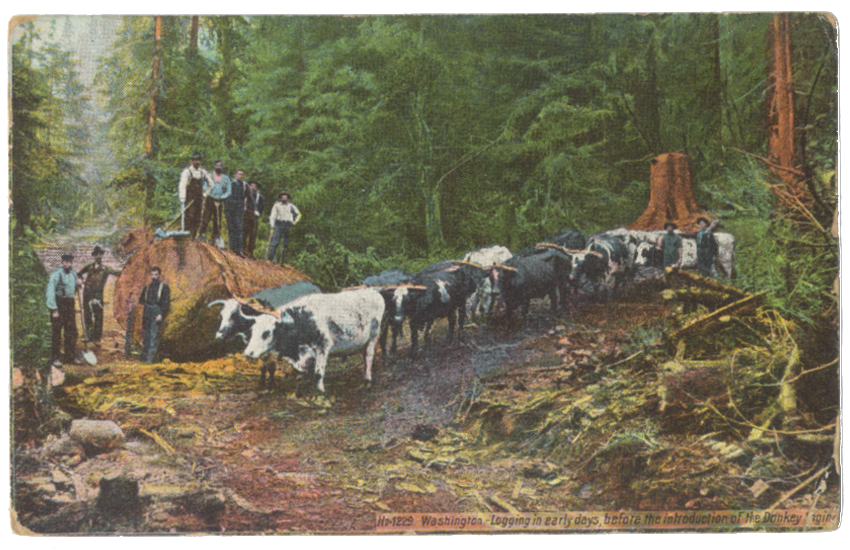
To be clear, tall tales can be found at the bottom of each page of this site. This page is more of a supplement to those already featured around the site. Still, if you would like an introduction before starting or simply desire more Bunyan tales, well, there can be no harm in that. So, without further ado, here are some tall stories for the lovers of oft-told tales
AND AWAY WE GO:
“PAUL BUNYAN
Every outdoorsman who has been in the north woods knows about Paul Bunyan. Stories of his remarkable prowess constitute a mighty legend of the forests that is told in ranger cabins and bunk houses from Maine to Oregon. Many a camper from the city has listened in open-mouthed wonder to tales of Paul's exploits, only to realize in a flash of light that it is all fiction.
For it is an art known only to woodsmen, this telling of the Bunyan tales with a solemnity of visage and an earnestness of accent which completely disarms the listener. And there is an art, too, in starting with quite plausible yarns, then to gradually broaden them until it suddenly dawns on the listener that he is being hoaxed, and joins in with the laugh at his expense.
In hearing of the man from the city, the forest rangers and cruisers will quite innocently, in recounting their experiences, mention that they worked for Paul in such-and-such a year—usually ‘the winter of the big snow’ or ‘the year of the two winters’ or some such important time—and others will remember that they, too, worked for Paul, and there will follow a comparing of notes which disclosed that they missed each other a Paul's many camps by hours, minutes and even seconds.
Then come the delightful reminscences of some of the things Paul did. You will learn that he used as a basis of transportation, the Blue Ox, a beast so large that it took two men to see across one of his tracks, and so strong that he once pulled a heavy chain with three-inch links right out into an iron bar. You will find that Bunyan invented the grindstone. When he moved to Dakota where there were no rocks nor hills to roll them down so his men could run alongside and sharpen their axes he invented the ‘revovling rock.’ And the first grindstone was so large that every time it turned around once, it was pay day.
Bunyan had an expert crew. There were the famous Seven Axemen, who cut down whole forests in a day by tying axe heads to ropes and advancing through the forest swinging them in great circles. And there was his expert cook, Ole, who carved his own niche in the hall of fame when he came to the rescue on the occasion of the Blue Ox dumping all of the winter's supply of beans into Round Pond. Ole took one look and then built a fire under the pond, making bean soup of the whole thing.”
—Will H. Dilg, The DeKalb Daily Chronicle, vol. 25, no. 285, November 9, 1925, DeKalb, Illinois
* * *
His camp flunkey, with two hundred pounds of bacon on each foot, would around the griddle, to grease it for hot cakes, and the cook used a steam shovel to flip 'em with. The waiters used wagons and roller skates, and thus got around the table.
But all this nonsense, so hysterically funny, when told by George, the droll, between giggles, in the light of the campfire, will seem flat and foolish, I fear, written down with pen and ink.
As I write, after supper, in a wonderful sunset glow, we look up suddenly, and there, over the trees, just above a cut between two mountain peaks, is a glorious yellow half-moon, so big as to be a regular Paul Bunnion moon.”
—Herma N. Clark, “The Ladies Would Go Hunting, Too - A Story of the Western Country,” Outer’s Book — Recreation, January, 1918
* * *
It seems years ago theys trees on most every inch of land where this city now rests and theys no place for to build even a chicken coup. The settlers get together and talk it over and decide to hire a bird named Paul Bunyan, which is none other than the party which logs off South Dakota and the Great American desert years ago.
Well Bunyan turns up and it seems he has quiet the outfit. This lumberman says it sure is one site to see his 1,000 (one thousand) oxen snaking logs into Link river, and I guess he is right. And theys so many men, working, Ed, this Bunyan has steamshovels picking strawberries for their breakfast. And when they cook hot cakes the sheff [chef] ties hams on the flunkies feet and let them skate back and forth acrost the stove to grease it. It takes a flunkey 16 (sixteen minutes) to make the round trip, the stove is that long. One flunkey which uses slabs of bacon for skates makes it in 15 (fifteen) minutes.
It seems they log off 9,000 (nine thousand) acres in six days and is ready to pull out Sunday, haveing also cut the logs into lumber for to build houses for these settlers I first tell you about.
Well, Ed, you go I am not much on this kidding stuff and I am not sure about what this lumberman tells me. The missus gets right hard about and says somebody been kidding you again and do not write Ed anything like bunk. But I go and look up another lumberman which tells me its a fact and Paul Bunyan is the bird which is responsible for the ball headed look on this country.
I have got a idear now to hire this Paul Bunyan myself, Ed, but no one seems to no whereat to look for him. Howsoever, when I find him, Ed, I will let you in on this idear I got.
Yrs. as befoar,
P.S.
The Comeing Loggar. ”
—P.S., “P.S. Gets An Ear-Full, Learns of Paul Bunyan,” The Evening Herald, July 22, 1922, Yr. 15, No. 6375, Klamath Falls, Oregon
* * *
Paul picked the dog up while he was still warm and put him together with two feet up and two feet down, so that when he got tired of running on one pair of legs, he could flop over and run on the other two.
— L.L. Houde, Wash., The Seatle Star, Nov. 25, 1920, vol. 23, Seattle, Washington
* * *
—J.D. Robins, “Paul Bunyan,” The Canadian Forum, Toronto, Ontario, February, 1926, Vol. VI, No. 65
* * *
— J. E. Horne, Journal of Electrical Workers and Operators, March 1926, Washington, D.C., Vol XXV, No. 3

He is the legendary character that we hear about in harvest time, when the men are smoking their pipes out under the trees after dinner. We hear of him also in the winter, when the farmers hauling grain on cold days get together around the stove at the country store for a few minutes. Our corn belt champion, however, amusing tho the accounts of his prowess may be, lacks a name and a really distinct body of legend.”
—Anonymous, Wallace’s Farmer, May 4, 1923, vol. 48, no. 18, Des Moines, Iowa
* * *
It is the divine right of guides and woodsmen to interpret the lakes, the streams, and the forests in which they live and work.
You can smile when your friend George tells of having almost caught a ten pound trout, and any yarn which seems to be within the realm of improbability is the sign for a thorough ‘razzing’ of any ordinary fisherman.
But not so when the guide tells his story. You've got to sit with a straight face, and you've got to believe it. Of course there's a limit. When John Schmoker, an upper Mississippi guide, tells you of having guided for a man who played a four pound bass so long that the fish was spoiled when finally he was brought to the net, you are permitted a slight smile.
‘I thought he'd never bring him to the boat,’ says John, ‘and you can believe it or not, when I finally slipped the net under him, he was so cold he wasn't fit to eat and we had to throw him away.’
Of course the old story of the fish being so numerous that ‘you can walk across the river on their backs without getting your feet wet’ is well known and often used, but is spite of its farcical character I once knew a northern guide who was willing to swear that you could do this in spawning time when the pike were running in the Crooked river in Minnesota. His name was Oscar Heikkila, and he declared that he had leaped across one small channel of the river on the backs of the milling fish.
Not so easy to believe is the solemn declaration of Donald Hough that he once saw so many bass in a small lake near the upper Mississippi that ’the fish on top were all sunburned.‘
Of course Paul Bunyan comes in for his share of attention by the guides and woodsmen generally of the northern states. As a rule, you do not have to remain around the campfire very long before you begin to hear stories of one Paul Bunyan, who, it seems, was a wonderful lumberjack, who could do almost anything.
The stories about Paul, in the hands of an artist of the woods, begin tamely, and you believe them without question. But gradually, as the evening wears on, Paul comes more ambitious.
This mighty man, mythical hero of the woods, invented a gun, you learn, with which he could shoot geese so high in the air that when they got to the ground they were spoiled (like Schmoker's bass) and you will also observe that when Bunyan wished to have fish for his big crew he simply built a fire under the river and cooked them on the spot. Then there was the time the fog got so thick that the fish all swam out of the river into it, and Bunyan got out his crew and they chased the fish into the woods where they got lost and couldn't find their was back to the river before the fog lifted.
Yes, you've got to get around a campfire in the woods if you would become an expert naturalist.”
—Will H. Dilg, The DeKalb Daily Chronicle, vol. 24, no. 269, October 18, 1924, DeKalb, Illinois

—A.G.B., “The Lighter Side of Engineering and Contracting - Who said Baron Munchausen was Dead?” Engineering and Contracting, November 10, 1915 vol. XLIV, no. 19
* * *
The game grew exceedingly hot,
All the coin lay in one little spot,
When a guy with a gat,
Butted in and stood pat,
While his pal waltzed away with the pot.
"Where were yoy working before," asked the clerk in the employment office.
"Me?" said the customer, "I worked for Paul Bunion."
"Don't know that camp. What were you doing?"
"Went ahead of the rigging crew with a maul [wooden mallet] and drove the stumps in the ground so the logs wouldn't hang of them."
"Speaking of queer jobs," said one boomer [transient worker], "I had a job once in the Yukon, chopping shadows off the sidewalk. You see, there was one egg in town and the gang had been standing in front of the window where it was on display for so long that their shadows had frozen fast in the snow."
"Well," said another, "I had a job in Arizona, throwing ice in a duck-pond to keep the ducks from laying hard-boiled eggs."”
—Anonymous, “Hazards of Logging,” Bulletin - Loyal Legion of Loggers and Lumbermen, July 1920, Vol. 2, No. 7, p. 34, Salem and Portland, Oregon
[ DISCLOSURE: THE FOLLOWING IS REAL!—believe me—READER INDISCRETION IS ADVISED! ]
NEXT! ☞
☜ BACK?
